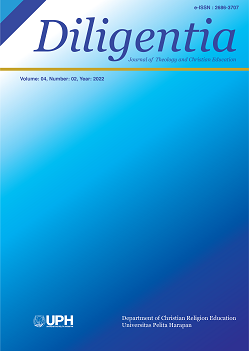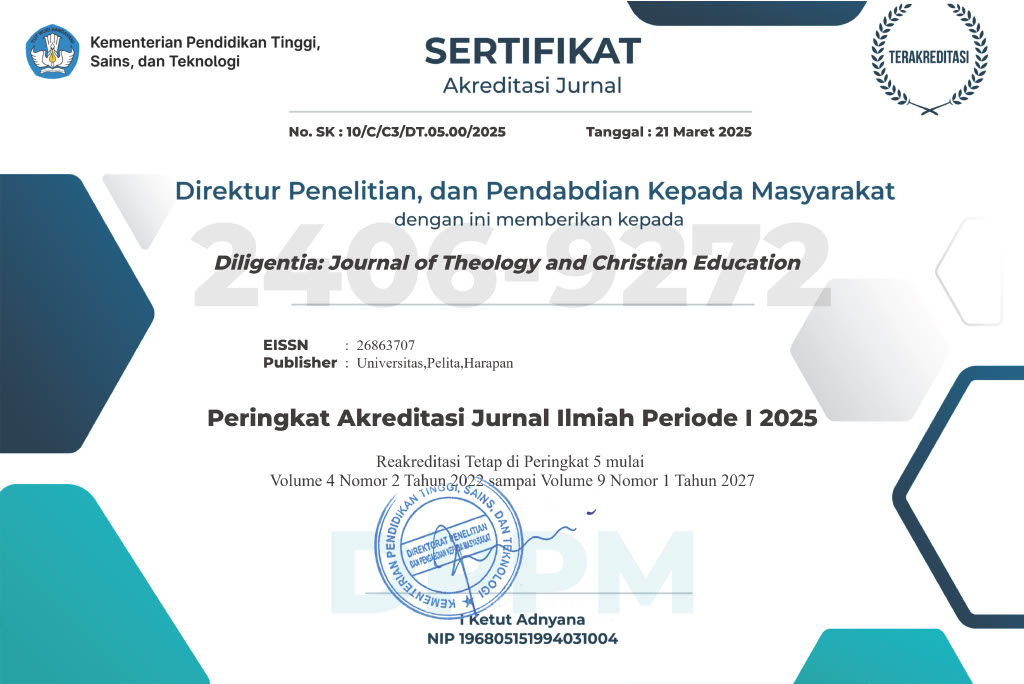Peran Guru Kristen Untuk Menanamkan Kedisiplinan Siswa Melalui Metode Pembiasaan dalam Pembelajaran Daring [The Role of Christian Teachers in Cultivating Discipline for Students Through the Method of Habituation During Online Learning]
DOI:
https://doi.org/10.19166/dil.v4i1.4822Schlagworte:
Habituation Methods, Discipline, Students, Online LearningAbstract
The pandemic caused by Covid 19 has made changes in learning. Previously, students came to school to study in class and meet directly with the teachers. Now, learning has been done online, where students learn from home. During this online learning, there were several problems related to discipline which caused the learning atmosphere to be less conducive. Based on these problems, the aim of the research is the application of the habituation method by Christian teachers can help students familiarize themselves to Christian values in applying discipline during online learning. The research method is descriptive qualitative research method by taking data based on observations and teaching results during the implementation of the Field Experience Practicum and literature study. The research shows that the application of habituation methods can shape student discipline during online learning. Therefore, it is concluded that the habituation method can be applied and suggested to the teachers in helping students have noble character through habituation in applying student discipline during online learning.
Literaturhinweise
Adhielvra, Gabriela, and Asih Enggar Susanti. “Peran Guru Kristen Sebagai Pemegang Otoritas Untuk Meningkatkan Disiplin Siswa Dalam Pembelajaran [The Role of Christian Teachers in Exercising Authority to Improve Discipline in Learning].” Diligentia: Journal of Theology and Christian Education 2, no. 2 (2020): 101-14. https://doi.org/10.19166/dil.v2i2.2220
Ahsanulkhaq, Moh. “Membentuk Karakter Religius Peserta Didik Melalui Metode Pembiasaan.” Jurnal Prakarsa Paedagogia 2, no. 1 (2019): 21-33. https://doi.org/10.24176/jpp.v2i1.4312
Akmaluddin, and Boy Haqiqi. “Kedisiplinan Belajar Siswa Di Sekolah Dasar (SD) Negeri Cot Keu Eung Kabupaten Aceh Besar (Studi Kasus).” Jurnal of Education Science (JES) 5, no. 2 (2019): 1-12. https://doi.org/https://doi.org/10.3314/jes.v5i2.467
Aziizu, Burhan Yusuf Abdul. “Tujuan Besar Pendidikan Adalah Tindakan.” Prosiding KS : RISET & PKM 2, no. 2 (2015): 295-300. https://doi.org/10.24198/jppm.v2i2.13540
Boangmanalu, I. A, and M. E Putri. “Penerapan Pendekatan Behavior Untuk Meningkatkan Kedisiplinan Pada Pembelajaran Bahasa Indonesia Kelas VIII.” Diligentia: Journal of Theology and Christian Education 3, no. 2 (2021): 151-71. https://doi.org/10.19166/dil.v3i2.3197
Brummelen, Harro van. Berjalan Dengan Tuhan Di Dalam Kelas : Pendekatan Kristiani Untuk Pembelajaran. Jakarta: Universitas Pelita Harapan Press, 2006.
Budiningsih, C. Asri. Belajar Dan Pembelajaran. Jakarta: PT Rineka Cipta, 2005.
Christiani, Yemima, and Kurniawati Martha. “Peran Guru Kristen Menghadirkan Shalom Community Melalui Prinsip Kedisiplinan.” Diligentia: Journal of Theology and Christian Education 3, no. 1 (2021): 64-72. https://doi.org/10.19166/dil.v3i1.2914
Hamalik, Oemar. Psikologi Belajar & Mengajar. Bandung: Sinar Baru Algesindo, 2010.
Hidayati, Fina Hanifa, and Firsta Adilaturrahmah. “Students’ Dicipline in Mathematics Learning During Covid-19 Pandemic.” Journal of Medives : Journal of Mathematics Education IKIP Veteran Semarang 5, no. 2 (2021): 391-401. https://doi.org/10.31331/medivesveteran.v5i2.1726
Ihsani, Nurul, Nina Kurniah, and Anni Suprapti. “Hubungan Metode Pembiasaan Dalam Pembelajaran Dengan Disiplin Anak Usia Dini.” Jurnal Ilmiah Potensia 3, no. 1 (2018): 50-55. https://doi.org/https://doi.org/10.33369/jip.3.2.105-110
Kemdikbud, Pengelola Web. “Kemendikbud Terbitkan Pedoman Penyelenggaraan Belajar Dari Rumah.” kemendikbud.go.id, 2020. https://www.kemdikbud.go.id/main/blog/2020/05/kemendikbud-terbitkan-pedoman-penyelenggaraan-belajar-dari-rumah.
Knight, George R. Filsafat & Pendidikan : Sebuah Pendahuluan Dari Perspektif Kristen. Jakarta: Universitas Pelita Harapan Press, 2009.
Mirdanda, Arsyi. Motivasi Berprestasi & Disiplin Peserta Didik Serta Hubungannya Dengan Hasil Belajar. Pontianak, Indonesia: YUDHA ENGLISH GALLERY, 2018.
Nadeak, Erni Hanna, and Dylmoon Hidayat. “Karakteristik Pendidikan Yang Menebus Di Suatu Sekolah Kristen [The Characteristics of Redemptive Education In a Christian School].” Polyglot: Jurnal Ilmiah 13, no. 2 (2017): 87-97. https://doi.org/10.19166/pji.v13i2.439.
Nopriadi, Eko. “Penerapan Metode Pembiasaan Untuk Menanamkan Nilai-Nilai Pendidikan Islam Pada Siswa SD Negeri 38 Janna-Jannayya Kecamatan Sinoa Kabupaten Bantaeng.” Universitas Islam Negeri Alauddin Makassar, 2016.
Prijanto, Jossapat Hendra, and Kardila Oktavia. “Tindakan Tepat Guru Kristen Menghadapi Siswa Bermasalah Dalam Perannya Menuntun Dan Membimbing Siswa.” Diligentia: Journal of Theology and Christian Education 3, no. 1 (2021): 1-15. https://doi.org/10.19166/dil.v3i1.2319.
Purba, Mery Kristina, and Imanuel Adhitya Wulanata Chrismastianto. “Peran Guru Kristen Sebagai Penuntun Siswa Memulihkan Gambar Dan Rupa Allah Dalam Kajian Etika Kristen.” Diligentia: Journal of Theology and Christian Education 3, no. 1 (2021): 83-92. https://doi.org/10.19166/dil.v3i1.2909.
Rahmawati, Siti. “Ini Lama Waktu Yang Dibutuhkan Untuk Membentuk Kebiasaan Baru.” gaya.tempo.co, 2021. https://gaya.tempo.co/read/1507348/ini-lama-waktu-yang-dibutuhkan-untuk-membentuk-kebiasaan-baru/full&view=ok.
Rajab, Muhammad. “Evaluasi Dan Optimalisasi Pembelajaran Daring.” news.detik.com, 2020. https://news.detik.com/kolom/d-4960905/evaluasi-dan-optimalisasi-pembelajaran-daring.
Rogers, Bill. You Know The Fair Rule : Strategies For Positive and Effective Behaviour Management and Discipline in Schools. 3th ed. Victoria: ACER Press, 2011.
Santrock, John W. Educational Psychology. 5th ed. New York: McGraw-Hill, 2011.
Semium, Yustinus, and OFM. Teori-Teori Behavioristik. Yogyakarta: Penerbit PT Kanisius, 2020. https://www.google.co.id/books/edition/Behavioristik/qEIHEAAAQBAJ?hl=id&gbpv=1.
Sendari, Anugerah. “Konsisten Adalah Ketetapan Bertindak, Ketahui Manfaat Dan Cara Membangunnya.” hot.liputan6.com, 2021. https://hot.liputan6.com/read/4678090/konsisten-adalah-ketetapan-bertindak-ketahui-manfaat-dan-cara-membangunnya.
Septiani, Lusi Vifi. “IMPLEMENTASI METODE PEMBIASAAN DALAM PEMBENTUKAN KARAKTER DI TAMAN KANAK-KANAK BAKTI II ARRUSYDAH KEDAMAIAN BANDAR LAMPUNG.” Universitas Islam Negeri (UIN) Raden Intan Lampung, 2017.
Sugiarto, Ahmad Pujo, Tri Suyati, and Padmi Dhyah Yulianti. “Faktor Kedisiplinan Belajar Pada Siswa Kelas X Smk Larenda Brebes.” Mimbar Ilmu 24, no. 2 (2019): 232-38. https://doi.org/10.23887/mi.v24i2.21279.
Sugiharto, Rahmat, and Supiana. “Pembentukan Nilai-Nilai Karakter Islami Siswa Melalui Metode Pembiasaan.” Educan : Jurnal Pendidikan Islam 1, no. 1 (2017). https://doi.org/10.21111/educan.v1i1.1299.
Sujana, I Wayan Cong. “Fungsi Dan Tujuan Pendidikan Indonesia.” ADI WIDYA : Jurnal Pendidikan Dasar 4, no. 1 (2019): 29-39. https://doi.org/http://dx.doi.org/10.25078/awv4i.927.
Sukatin, and M. Shoffa Saifillah Al-Faruq. Pendidikan Karakter. Slemab: Deepublish Publisher, 2020. https://www.google.co.id/books/edition/Pendidikan_Karakter/7kcyEAAAQBAJ?hl=id&gbpv=1.
Tung, Khoe Yao. Menuju Sekolah Kristen Impian Masa Kini. Yogyakarta: Penerbit ANDI, 2014.
Ulya, Khalifatul. “Pelaksanaan Metode Pembiasaan Di Pendidikan Anak Usia Dini Bina Generasi Tembilahan Kota.” Asatiza 1, no. 1 (2020): 49-60. https://doi.org/10.46963/asatiza.v1i1.58.
Warsito. “Peningkatan Sikap Kedisiplinan Melalui Apel Pagi Siswa Min Nglawu Sukoharjo.” Jurnal Komunikasi Pendidikan 1, no. 2 (2017): 155-60. https://doi.org/10.32585/jkp.v1i2.27.
Web, Pengelola. “Pembelajaran Online Di Tengah Pandemi Covid-19 Tantangan Yang Mendewasakan.” pusdatin.kemdikbud.go.id, 2020. https://pusdatin.kemdikbud.go.id/pembelajaran-online-di-tengah-pandemi-covid-19-tantangan-yang-mendewasakan/.
Wong, Harry K., Rosemary T. Wong, Lena Nuccio, Stacey Allred, and Jenn David-Lang. “Implementation Guide for THE First Days of School : How To Be An Effective Teacher,” 5th ed. Harry K. Wong Publications, 2018.
Downloads
Veröffentlicht
Zitationsvorschlag
Ausgabe
Rubrik
Lizenz
Authors who publish with this journal agree to the following terms:
1) Authors retain copyright and grant the journal right of first publication with the work simultaneously licensed under a Creative Commons Attribution License (CC-BY-SA 4.0) that allows others to share the work with an acknowledgement of the work's authorship and initial publication in this journal.
2) Authors are able to enter into separate, additional contractual arrangements for the non-exclusive distribution of the journal's published version of the work (e.g., post it to an institutional repository or publish it in a book), with an acknowledgement of its initial publication in this journal.
3) Authors are permitted and encouraged to post their work online (e.g., in institutional repositories or on their website). The final published PDF should be used and bibliographic details that credit the publication in this journal should be included














